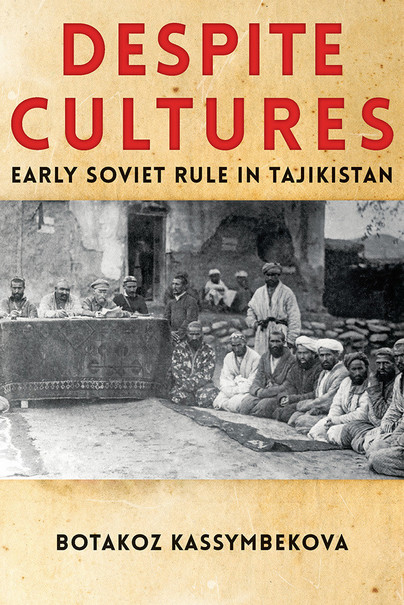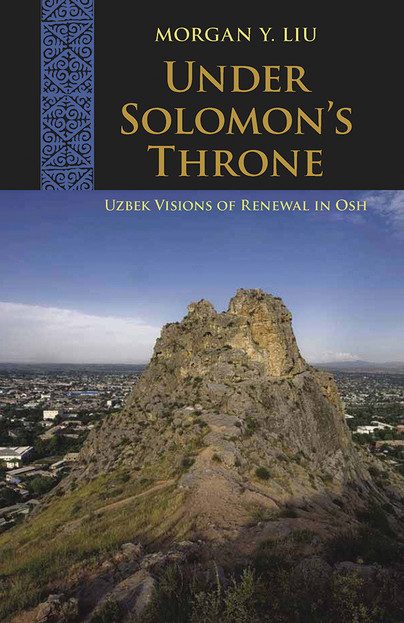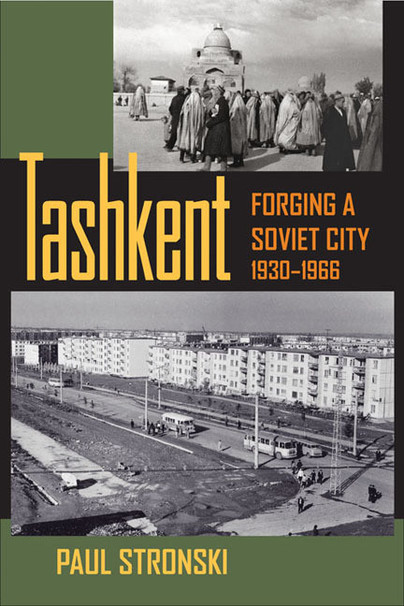Central Eurasia in Context
Publisher: University of Pittsburgh Press
Series Editor: Douglas Northrop, University of MichiganSeries Editor: Douglas Northrop, University of MichiganSeries Editor: Douglas Northrop, University of Michigan
Central Eurasia embodies a rich historical legacy that includes some of the world’s greatest art, epic literature, vast empires, nomadic peoples, great urban centers – manifested in a diverse array of cultures and nationalities. For millennia the economic and cultural crossroads of the immense Eurasian land mass, this region has exerted a powerful influence on the history of Europe, Asia, and the Middle East. Combining abundant natural resources and daunting terrain, alternately ignored and coveted by outside powers, this continental heartland is marked by many fault lines of historical and contemporary global conflict and plays a vital role in world politics. Yet for all its importance, Central Eurasia remains insufficiently explored by modern scholarship. Central Eurasia in Context provides a unique and valuable venue for the publication and promotion of the best scholarly work on and from this region.Central Eurasia embodies a rich historical legacy that includes some of the world’s greatest art, epic literature, vast empires, nomadic peoples, great urban centers – manifested in a diverse array of cultures and nationalities. For millennia the economic and cultural crossroads of the immense Eurasian land mass, this region has exerted a powerful influence on the history of Europe, Asia, and the Middle East. Combining abundant natural resources and daunting terrain, alternately ignored and coveted by outside powers, this continental heartland is marked by many fault lines of historical and contemporary global conflict and plays a vital role in world politics. Yet for all its importance, Central Eurasia remains insufficiently explored by modern scholarship. Central Eurasia in Context provides a unique and valuable venue for the publication and promotion of the best scholarly work on and from this region.Central Eurasia embodies a rich historical legacy that includes some of the world’s greatest art, epic literature, vast empires, nomadic peoples, great urban centers – manifested in a diverse array of cultures and nationalities. For millennia the economic and cultural crossroads of the immense Eurasian land mass, this region has exerted a powerful influence on the history of Europe, Asia, and the Middle East. Combining abundant natural resources and daunting terrain, alternately ignored and coveted by outside powers, this continental heartland is marked by many fault lines of historical and contemporary global conflict and plays a vital role in world politics. Yet for all its importance, Central Eurasia remains insufficiently explored by modern scholarship. Central Eurasia in Context provides a unique and valuable venue for the publication and promotion of the best scholarly work on and from this region.

Format: Paperback
Pages: 296
ISBN: 9780822964193
Pub Date: 11 Oct 2016
Description:
Despite Cultures examines the strategies and realities of the Soviet state-building project in Tajikistan during the 1920s and 1930s. Based on extensive archival research, Botakoz Kassymbekova analyzes the tactics of Soviet officials at the center and periphery that produced, imitated, and improvised governance in this Soviet southern borderland and in Central Asia more generally. She shows how the tools of violence, intimidation, and coercion were employed by Muslim and European Soviet officials alike to implement Soviet versions of modernization and industrialization.
In a region marked by ethnic, linguistic, and cultural diversity, the Soviet plan was to recognize these differences while subsuming them within the conglomerate of official Soviet culture. As Kassymbekova reveals, the local ruling system was built upon an intricate network of individuals, whose stated loyalty to communism was monitored through a chain of command that stretched from Moscow through Tashkent to Dushanbe/Stalinabad. The system was tenuously based on individual leaders who struggled to decipher the language of Bolshevism and maintain power through violent repression.

Format: Paperback
Pages: 240
ISBN: 9780822964131
Pub Date: 24 Jun 2016
Description:
Based on the case of Kyrgyzstan, while going well beyond it to elaborate a theory of the developing state that comprehends corruption as not merely criminal, but a type of market based on highly rational decisions made by the powerful individuals within, or connected to, the state.

Format: Paperback
Pages: 248
ISBN: 9780822962069
Pub Date: 30 Jul 2012
Description:
Speaking Soviet with an Accent presents the first English-language study of Soviet culture clubs in Kyrgyzstan. These clubs profoundly influenced the future of Kyrgyz cultural identity and fostered the work of many artists, such as famed novelist Chingiz Aitmatov.Based on extensive oral history and archival research, Ali Igmen follows the rise of culture clubs beginning in the 1920s, when they were established to inculcate Soviet ideology and create a sedentary lifestyle among the historically nomadic Kyrgyz people.
These \u201cRed clubs\u201d are fondly remembered by locals as one of the few places where lively activities and socialization with other members of their ail (village or tribal unit) could be found. Through lectures, readings, books, plays, concerts, operas, visual arts, and cultural Olympiads, locals were exposed to Soviet notions of modernization. But these programs also encouraged the creation of a newfound \u201cKyrgyzness\u201d that preserved aspects of local traditions and celebrated the achievements of Kyrgyz citizens in the building of a new state. These ideals proved appealing to many Kyrgyz, who, for centuries, had seen riches and power in the hands of a few tribal chieftains and Russian imperialists.This book offers new insights into the formation of modern cultural identity in Central Asia. Here, like their imperial predecessors, the Soviets sought to extend their physical borders and political influence. But Igmen also reveals the remarkable agency of the Kyrgyz people, who employed available resources to meld their own heritage with Soviet and Russian ideologies and form artistic expressions that continue to influence Kyrgyzstan today.

Format: Paperback
Pages: 328
ISBN: 9780822961772
Pub Date: 02 May 2012
Description:
Winner of the 2014 Central Eurasian Studies Society Book Award in the Social Sciences.Under Solomon's Throne provides a rare ground-level analysis of post-Soviet Central Asia's social and political paradoxes by focusing on an urban ethnic community: the Uzbeks in Osh, Kyrgyzstan, who have maintained visions of societal renewal throughout economic upheaval, political discrimination, and massive violence.Morgan Liu illuminates many of the challenges facing Central Asia today by unpacking the predicament of Osh, a city whose experience captures key political and cultural issues of the region as a whole.
Situated on the border of Uzbekistan and Kyrgyzstan—newly independent republics that have followed increasingly divergent paths to reform their states and economies—the city is subject to a Kyrgyz government, but the majority of its population are ethnic Uzbeks. Conflict between the two groups led to riots in 1990, and again in 2010, when thousands, mostly ethnic Uzbeks, were killed and nearly half a million more fled across the border into Uzbekistan. While these tragic outbreaks of violence highlight communal tensions amid long-term uncertainty, a close examination of community life in the two decades between reveals the way Osh Uzbeks have created a sense of stability and belonging for themselves while occupying a postcolonial no-man's-land, tied to two nation-states but not fully accepted by either one.The first ethnographic monograph based on extensive local-language fieldwork in a Central Asian city, this study examines the culturally specific ways that Osh Uzbeks are making sense of their post-Soviet dilemmas. These practices reveal deep connections with Soviet and Islamic sensibilities and with everyday acts of dwelling in urban neighborhoods. Osh Uzbeks engage the spaces of their city to shape their orientations relative to the wider world, postsocialist transformations, Islamic piety, moral personhood, and effective leadership. Living in the shadow of Solomon's Throne, the city's central mountain, they envision and attempt to build a just social order.
Chaos, Violence, Dynasty
Politics and Islam in Central Asia
Format: Paperback
Pages: 232
ISBN: 9780822961680
Pub Date: 14 Oct 2011
Description:
In the post-Soviet era, democracy has made little progress in Central Asia. In Chaos, Violence, Dynasty, Eric McGlinchey presents a compelling comparative study of the divergent political courses taken by Kyrgyzstan, Uzbekistan, and Kazakhstan in the wake of Soviet rule. McGlinchey examines economics, religion, political legacies, foreign investment, and the ethnicity of these countries to evaluate the relative success of political structures in each nation.
McGlinchey explains the impact of Soviet policy on the region, from Lenin to Gorbachev. Ruling from a distance, a minimally invasive system of patronage proved the most successful over time, but planted the seeds for current \u201cneo-patrimonial\u201d governments. The level of direct Soviet involvement during perestroika was the major determinant in the stability of ensuing governments. Soviet manipulations of the politics of Uzbekistan and Kazakhstan in the late 1980s solidified the role of elites, while in Kyrgyzstan the Soviets looked away as leadership crumbled during the ethnic riots of 1990. Today, Kyrgyzstan is the poorest and most politically unstable country in the region, thanks to a small, corrupt, and fractured political elite. In Uzbekistan, Islam Karimov maintains power through the brutal suppression of disaffected Muslims, who are nevertheless rising in numbers and influence. In Kazakhstan, a political machine fueled by oil wealth and patronage underlies the greatest economic equity in the region, and far less political violence. McGlincheyÆs timely study calls for a more realistic and flexible view of the successful aspects of authoritarian systems in the region that will be needed if there is to be any potential benefit from foreign engagement with the nations of Central Asia, and similar political systems globally.

Format: Paperback
Pages: 368
ISBN: 9780822961130
Pub Date: 19 Sep 2010
Description:
Paul Stronski tells the fascinating story of Tashkent, an ethnically diverse, primarily Muslim city that became the prototype for the Soviet-era reimagining of urban centers in Central Asia. Based on extensive research in Russian and Uzbek archives, Stronski shows us how Soviet officials, planners, and architects strived to integrate local ethnic traditions and socialist ideology into a newly constructed urban space and propaganda showcase. The Soviets planned to transform Tashkent from a \u201cfeudal city\u201d of the tsarist era into a \u201cflourishing garden,\u201d replete with fountains, a lakeside resort, modern roadways, schools, hospitals, apartment buildings, and of course, factories.
The city was intended to be a shining example to the world of the successful assimilation of a distinctly non-Russian city and its citizens through the catalyst of socialism. As Stronski reveals, the physical building of this Soviet city was not an end in itself, but rather a means to change the people and their society. Stronski analyzes how the local population of Tashkent reacted to, resisted, and eventually acquiesced to the cityÆs socialist transformation. He records their experiences of the Great Terror, World War II, StalinÆs death, and the developments of the Krushchev and Brezhnev eras up until the earthquake of 1966, which leveled large parts of the city. Stronski finds that the Soviets established a legitimacy that transformed Tashkent and its people into one of the more stalwart supporters of the regime through years of political and cultural changes and finally during the upheavals of glasnost.





